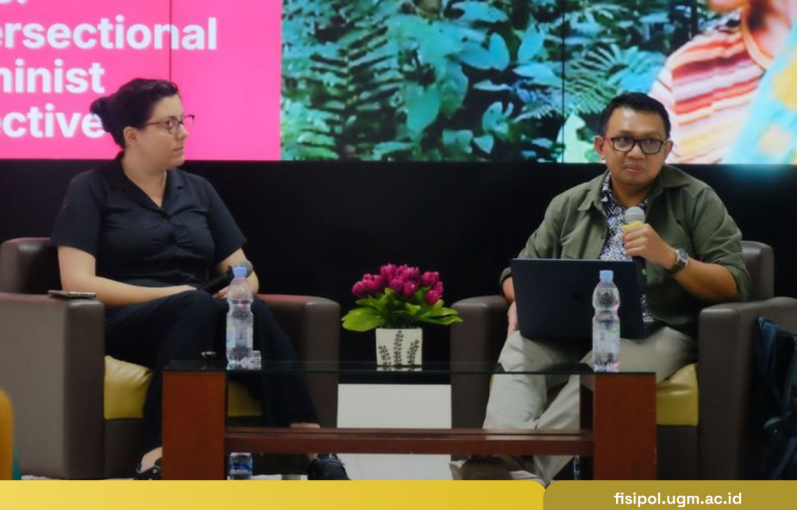
Yogyakarta, 27th of June 2024─The Department of Politics and Governance (PolGov) of UGM has worked together with UGM’s Unit of Research, Community Service and Publication (UP3M) in organizing a workshop with the topic of “Anti-Colonial Methodologies in Environmental Studies: An Intersectional Ecofeminist Perspective.” This topic in particular was chosen in order to dive deep into environmental studies by using the combinations of two perspectives, mainly anti-colonial and ecofeminist. This workshop was held offline in the Fisipol Auditorium, 4th floor of the Fisipol UGM building and online through a livestream from the YouTube channel of UGM’s Department of Politics and Governance on Thursday (27/06). The event’s presenters include source person Dr. Elena Burgos Martinez, an Assistant Professor at Leiden University Institute for Arena Studies, and facilitator Hasrul Hanif, as Lecturer from the Department of Politics and Governance.
Dr. Elena pictured decolonisation in three perspectives, which includes the historical period, the movement period, and decolonisation in knowledge. “The process of decolonization is not just about physical violence but it is about epistemic violence as well.”
Dr. Elena said that, “We have to take back the knowledge in order for us to start decolonisation”. Meaning, we would have to prioritize the perspective, as well as local knowledge and customs that were neglected due to colonial domination. Not just that, we would have to free the minds or institutions from colonial influences that lingers on till this day. In a research process about decolonisation, there needs to be a critical reflection against the colonial legacies that still exist, we can look back at the narratives about development that are repeated back and back again by the Europeans. “We need to reject the way of thinking that supports violence, domination, and European biases in order to truly overcome the limitations of modern reason,” explained Dr. Elena, citing her words from Dussel, an Argentinian researcher.
“In academic traditions, it is important for us to have both the tradition of reflectivity and positionality that is often unheard of in the Indonesian academic sphere,” Hanif explained. Hanif exemplified the process of Indonesia’s Kuliah Kerja Nyata or KKN, that is often seen and recognized as heroic for empowering underdeveloped regions.
Dr. Elena concluded that in the process of research as well as decolonisation, we have to always think critically about the process of knowledge, perform approaches critically with the history of academic imagination, understand and learn the subject of the study furthermore before giving assumptions, and to place yourself in the shoes of the analyzed.
Furthermore, the workshop was also filled with materials from Dr. Elena Burgos Martinez and discussions with the participants, live on the scene or on the livestream. This event is aligned with achieving the Sustainable Development Goals (SDGs), particularly SDG 17 Partnership for the Goals and SDG 4 Quality Education.
